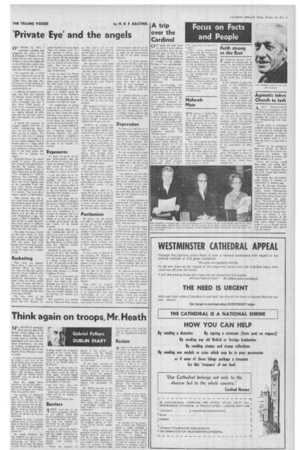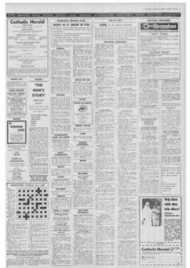Page 3, 29th October 1971
Page 3

Report an error
Noticed an error on this page?If you've noticed an error in this article please click here to report it.
Tags
Share
Related articles
Six Into Ten Is A Step In The Dark
Gabriel Fallon's Dublin Diary
Inquiry A Blow For Faulkner
Citizens Of All Creeds Pray For Peace
Gabriel Fallon's Dublin Diary
Think again on troops, Mr. Heath
Gabriel Fallon's DUBLIN DIARY
MR. HEATH'S seemingly fixed opinion that if the British Army pulled out of Northern Ireland the result would issue in terrible and immediate civil war calls for close examination, not only of existing circumstances in Northern Ireland but of the British Prime Minister's state of mind.
it takes two well-armed sides to make a civil war, as we in the South know to our cost. And we have the assurances of Mr. Faulkner and his Ministers, as well as the evidence of arrest and detention without trial, that—the British forces excepted—only one side in the North is armed.
Does Mr. Heath know something we do not know— something that Mr. Faulkner and his colleagues are hiding from the general view'?
The pouring of additional troops into Northern Ireland has so far seemed to have done little more than to provide extra targets for the gunmen. The blowing up of crossBorder roads (as quickly filled in again) is to anyone who knows the Border an exercise in futility.
Looked at from a purely military point of view the situation in the North has reached the threshold of chaos despite the assurances of those in command.
Mr. Heath, however, has not confined his view of civil war to the North. Without particularising the likely cornbatants he includes the South as well. Could it be that he is
thinking within the outmoded concept of the United Kingdarn of Great Britain and Ireland and fears that the South will challenge the presence of the British Army in the North?
In a time which calls for statesmen rather than soldiers, Mr. Heath would do well to think again. Violence begets violence; force merely breeds force. As an English poet wrote of the Spanish civil war:
Until men know their own hearts and their own crimes, There will be but death on the plains and on the mountains. There will be no singing by the fountains, No end to these black times.
Barriers
TNTIL such time as the
%.--) strict segregation barriers of our schools North and South are breached and Catholics and Protestants can learn, live and love together as Christians we can expect civil unrest in our country."
Thus Dr. Edward M. Walsh. Director of the National Institute for Higher Education, in his address to the European Association of Teachers conference held recently in Dublin.
-While the majority of
people in this country are Catholics," said Dr. Walsh, "an observer may be justified in questioning if all of them are Christians.
"If the basic principle of love of neighbour permeated our thinking to the extent it might, we would not be so myopic when the question arises of Protestant and Catholic children learning Irish. mathematics, English and even history and geography together."
Dr. Walsh was just as emphatic on segregation by sex. declaring that neither our young men nor young women had received a balanced sex education. "Anything they know about sex is gleaned in a guilt-ridden fashion from older students, or from gaudy publ ica t ions.
"As for religious instruction this could be solved, as it had been solved elsewhere by permitting students to attend the religious classes of their choice during certain regular periods."
More and more parents are gradually coming round to Dr. Walsh's point of view but it will be a long time before those who control education in this country will relinquish a form of teaching in which every subject is informed with
denominational bias; and history* as often as not, is taught with an exaggerated nationalism.
Racism
Vpart of the action taken under the United Nations programme for the observance of 1971 as the year for action against racism, the Irish Government has decided to increase by over 80 per cent their contribution to the U.N. Trust Fund for South Africa and to contribute 55,000 to the U.N. Training and Education programme for Southern Africa.
The Government also gave a grant towards the Irish AntiApartheid Movement's seminar entitled "The Churches and Racialism: Our Responsibilities" held in September in Dublin.
In a message to the organisers, U Thant, the U.N. Secretary General, said: "The activities of non-government organisations to educate world public opinion on the evils and dangers of the persistence of racial discrimination are of the utmost importance for the success of these efforts." He wished the conference every success.
On October 18 the Department of Posts and Telegraphs issued a stamp featuring a special design chosen by the United Nations. The design symbolises, in respect of human rights and fundamental freedom, the concept of equality and the absence of discrimination on grounds such as race. coltiiir and ethnic origin.
blog comments powered by Disqus









